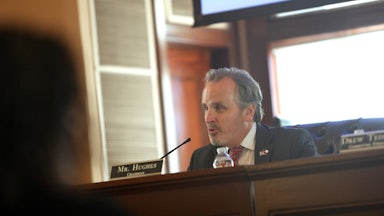On Thursday, one of Ohio’s former top politicians will be sentenced to prison for up to two decades for his role in a massive bribery scandal that left his constituents paying to bail out failing coal and nuclear plants. Yet last week, Republicans in the state legislature—some with interests in keeping coal plants open—pushed back on an attempt to repeal one of the most egregious elements of this bad legislation. Even while prison terms are being handed down, Ohioans remain on the hook for propping up two 1950s-era coal plants. The message sent to Ohioans is clear: Our health and pocketbooks matter far less to some state-level politicians than protecting the coal industry.
Former Ohio Speaker of the House Larry Householder and former state GOP leader Matt Borges will be sentenced this week for a racketeering conspiracy that traded $61 million in campaign donations in exchange for a $1.3 billion bailout for two Ohio nuclear plants, one Ohio coal plant, and another coal plant in Indiana, while also reducing energy efficiency standards across the state. Householder and Borges were convicted in March, when a federal jury found that the two took and offered bribes using money from FirstEnergy Corp, a powerful regional utility and owner of the nuclear plants, and others as part of a broader dark-money scheme involving a piece of legislation called House Bill 6.
It is the largest public corruption case in Ohio history—and Ohioans are still footing the bill for the crooked legislation to the tune of $130,376 per day in coal-power subsidies, according to the Ohio Consumers’ Counsel. Ohioans have already paid out over $400 million to subsidize the coal-fired power plants, according to a report commissioned by the Ohio Manufacturers’ Association, with a total of $850 million anticipated by 2030.
Even before the public knew that our state leaders were on the take from utilities and coal companies, H.B. 6 was wildly unpopular with Ohioans. Passed in 2019 and with the subterfuge name “Creates Ohio Clean Air Program,” H.B. 6 was opposed in polls of Ohioans regardless of political affiliation, with unsurprisingly steep opposition across the board to bailing out a coal plant in another state.
Most Ohioans are not awash in cash to toss into a cesspool of political intrigue. Ohio’s poverty rate has exceeded the nation’s since 2016. Levels of student debt are higher in the state than nationally, while large swaths of Ohioans spend at least half their income on housing alone. Ohioans’ energy costs are also spiking for reasons many cannot discern from their monthly bills, which now include, along with other hidden riders, one for those coal plant subsidies. People stretching every dollar may not even realize how much of their money is going toward those coal plants, even while Ohio’s outdoor air quality is worse than most other states’.
“In order to justify the cost of bailing out” the nuclear and coal plants, “lawmakers effectively eliminated the renewable portfolio standard in Ohio, which required Ohio utilities to purchase a certain percentage of their power from renewable energy,” said Nolan Rutschilling, managing director of energy policy at the Ohio Environmental Council. Without the renewable energy requirement, Ohio utilities largely went back to purchasing energy from coal and natural gas, which now source most of Ohio’s energy, Rutschilling said. Presently, Ohioans are seeing even higher energy costs, exacerbated by supply chain issues dating from the pandemic and the war in Ukraine.
“If we had a more diversified electric grid, we’d be able to reduce the impact” of the natural gas market’s volatility “by purchasing more from wind or solar,” Rutschilling told me.
After Householder’s and Borges’s convictions in March 2023, Democratic state Representatives Casey Weinstein and Sean Brennan led a bipartisan push to repeal the coal plant bailout and require full repayment of the bailout to date. Days after Householder’s arrest in 2020, Governor Mike DeWine, who had been instrumental in the effort to pass H.B. 6, changed course, asking for legislation to repeal the nuclear bailout portion of H.B. 6; DeWine signed the repeal into law in 2021. But the coal bailout and decimated renewable energy portfolio standards remained.
Last week, a bill aimed at repealing the portion of H.B. 6 that created subsidies for the two coal plants was blocked by Ohio House Republican leadership. One coal plant receiving subsidies is located in current Ohio House Speaker Jason Stephens’s district. Representative Derek Merrin, also a Republican, pointed out to local media that the same utility lobbyists who backed Householder and lobbied for the subsidies supported Stephens’s speaker campaign.
The bill to repeal the coal plant subsidies, which was introduced months ago, had not received any hearings, leaving Weinstein and Brennan to attempt a procedural method called a discharge petition to try to go around the speaker and get a floor vote. Now that Stephens has recalled the bill, it’s unclear how or when the bill might proceed.
Weinstein, whose repeal was garnering bipartisan support, told me he senses voters are shocked at the corruption around H.B. 6. It’s astounding, after all, that a piece of legislation now resulting in jail sentences and massive fines “is still very much Ohio’s energy policy—what passes for an energy policy for us.”
“We’re screwing Ohioans,” Weinstein said. “Ohioans are having to pay the bill for this corruption, and that’s not fair. That’s not right. And now we’re denying them even a vote on the issue,” as energy bills continue to rise and “the guy at the center of the whole thing is going to jail.”
Given the former speaker’s looming prison sentence, the average voter might expect contrition from the state representatives who also benefited from Householder’s PAC and the dark money flowing through it. FirstEnergy has confessed to the scheme and paid a $230 million fine. Yet, according to the Akron Beacon Journal, candidates in all but 15 of Ohio’s 99 House districts received help from Householder’s PAC and for-profit Hardworking Ohioans, Inc.—either directly or through ads attacking their opponents. Governor Mike DeWine, for his part, appointed energy lobbyist Sam Randazzo as head of the Public Utilities Commission of Ohio months before H.B. 6 was introduced to the legislature. FirstEnergy later admitted to regulators that it had paid Randazzo, who helped write the legislation, a $4.3 million bribe.
While Randazzo and former FirstEnergy executives have not been charged with any crimes to date, the lawmakers most likely to carry the tarnish from Householder’s dirty dealing aren’t actually that beholden to Ohio voters.
Due to gerrymandering, many legislators in Ohio “never face elections they worry about. Many don’t even face opponents,” said David Pepper, former Ohio Democratic Party chair and author of Laboratories of Autocracy. In such a system, incentives get warped. Lawmakers in severely stilted districts get “rewarded for being extremist rather than mainstream” and “for giving everything to private players and entities … even if that is taking those things from the public.” Every once in a while someone like Householder gets caught on tape, said Pepper, but more often, a “broader corruption of public service” almost becomes a norm, and leaders are rarely held accountable.
Representative Weinstein too believes gerrymandering factors into the lack of reform in Columbus. “The vast majority of our legislators, particularly in the majority,” benefit from or helped design districts to shield themselves from voters. “They are protected and insulated,” he says. “So they just do whatever they think is going to keep money flowing and keep from having a primary.” This makes it difficult to strike compromises or motivate introspection. The rhythm of corruption and scandal has become a sort of background music at the Ohio statehouse.
Ohio is certainly not the only state gripped by gerrymandering: Wisconsin and Pennsylvania have seen their share of lopsided districts and extreme legislation. And Ohio is also not the only state in which Republican legislators are protecting or propping up the coal industry. In West Virginia, where some regulators had ties to the H.B. 6 scandal over the state border, Governor Jim Justice signed a law this year that would make it illegal to retire a coal plant without approval from a panel stacked with former coal lobbyists. In Kentucky, Republican lawmakers this session pushed through legislation that would make retiring aging and expensive coal plants more difficult. Despite the potential costs to ratepayers, that bill became law without the governor’s signature in late March. Other pro-coal bills have been proposed in Indiana, Utah, and Wyoming. Some other states have even seen their own mini-scandals: A 2021 law in Montana meant to help keep a coal-fired power plant open was thrown out last year for violating the U.S. Constitution, and the state now has to pay $825,000 to the owners of the power plant who were targeted by the bad bill.
Pepper believes that in a state like Ohio with shrinking local media, people may be aware of their U.S. Congress or tuned in to their local officials, like the mayor, school board, and city council. Yet many voters don’t understand the relevance of the state legislature, even when a former speaker is headed to prison—and even when the result of their crimes, in the form of a coal bailout, is tucked into our monthly bills.
“Many don’t know how the statehouse impacts them,” said Pepper, “and that’s a real problem.”










